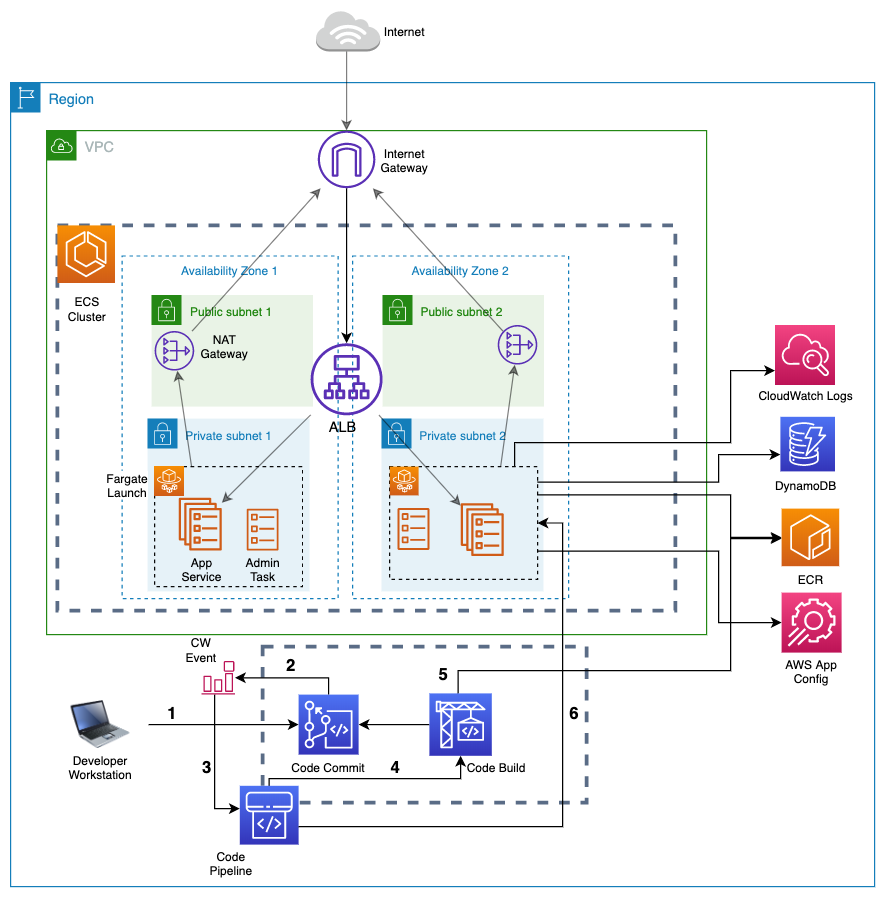Containers
Category: Compute
Modernize Java and .NET applications remotely using AWS App2Container
Since the launch of AWS App2Container, customers have been asking for the ability to remotely manage the migrations of Java and .NET applications running on Windows or Linux hosts. Beginning with the version 1.2 of App2Container, users can accomplish containerization of their workloads without installing A2C software on the application servers. The remote execution feature […]
Improving daemon services in Amazon ECS
When using Amazon EC2 for compute capacity in Amazon Elastic Container Service (Amazon ECS) clusters, a common pattern customers follow is to schedule a single instance of a task across all or select nodes in the cluster. This includes running tasks that handle log and/or metrics collection such as Fluentd or the DataDog agent, node […]
Planning Kubernetes Upgrades with Amazon EKS
In February, Amazon Elastic Kubernetes Service (Amazon EKS) released support for Kubernetes version 1.19. We announced this through the usual mechanisms with our What’s New post and updates in Amazon EKS documentation. After some conversations both internally and with our customers, we have decided to start regular AWS Containers blog posts on Amazon EKS Kubernetes […]
Amazon ECS on AWS Fargate now enables customers to configure ephemeral storage up to 200GiB
Today, we are announcing support in AWS Fargate to configure ephemeral storage up to 200 GiB in size. Tens of thousands of customers use Amazon Elastic Container Service (Amazon ECS) with AWS Fargate to benefit from the serverless compute model for a wide variety of container-based applications at scale. As container adoption has grown, […]
Developing Twelve-Factor Apps using Amazon ECS and AWS Fargate
Sushanth Mangalore and Chance Lee, AWS Solutions Architects, SMB Introduction The twelve-factor methodology helps you build modern, scalable, and maintainable software-as-a-service apps. The methodology is technology agnostic and has become a widely-adopted approach to developing cloud-native applications. There are a few different ways to develop twelve-factor applications on AWS. Solutions based on containers technology are a […]
Compliance as Code for Amazon ECS using Open Policy Agent, Amazon EventBridge, and AWS Lambda
Customers are looking for ways to implement best practices/policies that enforce security and ongoing compliance. These best practices apply to workloads running on Amazon Elastic Container Service (Amazon ECS). Nowadays, policies can be expressed as code and evaluated before workloads are deployed. This enables you to consistently enforce best practices and prevent workloads that violate […]
Monitoring your service mesh container environment using Amazon Managed Service for Prometheus
NOTICE: October 04, 2024 – This post no longer reflects the best guidance for configuring a service mesh with Amazon ECS and Amazon EKS, and its examples no longer work as shown. For workloads running on Amazon ECS, please refer to newer content on Amazon ECS Service Connect, and for workloads running on Amazon EKS, […]
Deploying managed P4d Instances in Amazon Elastic Kubernetes Service with NVIDIA GPUDirectRDMA
In March 2021, Amazon EKS announced support for Amazon EC2 P4d instances, enabling you to launch a fully managed EKS cluster based on the latest NVIDIA A100 GPUs. Amazon EC2 P4d instances are the next generation of GPU-based instances that provide the best performance for machine learning (ML) training and high performance computing (HPC) in […]
Containerizing Lambda deployments using OCI container images
This post is contributed by Mark Sweat, Senior Software Architect with Koch Industries. Developers looking to run their code with AWS in a serverless fashion have had to make a decision between two separate runtime models – each with a distinct packaging and deployment pattern. The two choices we have had are running functions as […]
AWS Secrets Manager controller POC: an EKS operator for automatic rotation of secrets
In an earlier blog post, we showed you how to mount a secret from AWS Secrets Manager using mutating webhooks. If this secret changes when the pod is in running state, the pod can’t capture the change and continues to use the old secret value. One solution is to terminate the pod and then re-create it. […]







